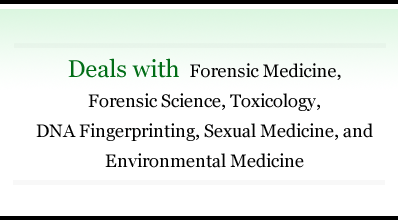ABOUT JOURNAL
Journal is now open access and online issues can be seen at ---> Click on this link-medicopublication.com/index.php/ijfmt
where HTML and PDf copies are uplaoded“Indian Journal of Forensic Medicine & Toxicology ” is a double-blind peer reviewed international journal. The frequency is quarterly. It deals with Forensic Medicine, Forensic Science, Toxicology, DNA fingerprinting, sexual medicine, environmental medicine, Forensic Pathology, legal medicine and public health laws. It has been assigned International standard serial No. p-0973-9122 and e-0973-9130. The Journal has been assigned RNI No. DELENG/2008/21789.The journal is indexed with Google Scholar, Scilit, CINAHL, EBSCOhost (USA),Embase (upto Jan 2025) and many other international databases.
This is an open access journal which means that all content is freely available without charge to the user or his/her institution. Users are allowed to read, download, copy, distribute, print, search, or link to the full texts of the articles, or use them for any other lawful purpose, without asking prior permission from the publisher or the author. This is in accordance with the BOAI definition of open access.
Scope of Journal:
Aims:
IJFMT aims to serve the specialized needs of professionals, researchers, and practitioners in the fields of forensic medicine and toxicology. Our aims include:
- Dissemination of Research and Knowledge: To publish original research articles, reviews, and case studies that contribute to the body of knowledge in forensic medicine and toxicology. This involves sharing advancements in forensic science, investigative techniques, and toxicological analyses.
- Case Reports and Studies: To provide a platform for the publication of case reports and studies that highlight unique or challenging forensic cases, contributing to the understanding of specific forensic and toxicological issues.
- Promotion of Best Practices: To promote best practices in forensic investigations, autopsies, and toxicological analyses. The journal may publish articles that discuss standard operating procedures,methodologies, and advancements in forensic techniques.
- Education and Training: To contribute to the education and training of forensic professionals,pathologists, toxicologists, law enforcement, and legal professionals. This includes publishing articles that provide insights into emerging trends, technologies, and methodologies in forensic medicine and toxicology.
- Legal and Ethical Considerations: To explore and discuss legal and ethical considerations in forensic practice. This may involve addressing issues related to the admissibility of forensic evidence in court, ethical guidelines for forensic practitioners, and the impact of forensic findings on legal proceedings.
- Toxicology Advances: To focus on toxicology-related research, including studies on the effects of drugs, poisons, and other substances on the human body. This may encompass both clinical and postmortem toxicology.
- Interdisciplinary Collaboration: To foster collaboration between forensic medicine, toxicology, and related disciplines. This includes interdisciplinary research that may involve fields such as genetics,pathology, chemistry, and criminal justice.
- Quality Assurance and Standardization: To uphold high standards in forensic and toxicological analyses by publishing articles on quality assurance, validation of methods, and standardization of procedures.
- Forensic Psychiatry: To cover aspects of forensic psychiatry, including assessments of mental states, criminal responsibility, and the intersection of psychiatry with legal and forensic issues.
- Global Perspectives: To provide a global perspective on forensic medicine and toxicology by featuring research and insights from various regions and jurisdictions.
Audience:
- Forensic Scientists: Professionals involved in the application of scientific methods to legal investigations, including forensic pathologists, toxicologists, forensic chemists, and other specialists.
- Medical Examiners and Coroners: Individuals responsible for investigating and determining thecause of death in cases of sudden, suspicious, or unexplained deaths.
- Law Enforcement Professionals: Police officers, detectives, and other law enforcement officials involved in criminal investigations.
- Legal Professionals: Attorneys, judges, and legal scholars interested in the intersection of medicine, science, and the law.
- Researchers and Academics: Scholars and researchers in forensic science, toxicology, and related disciplines.
- Medical and Healthcare Professionals: Clinicians interested in the medical aspects of legal cases,such as sexual assault examinations and medical expert witnesses.
- Forensic Psychologists: Professionals applying psychological expertise to legal and criminal investigations.
- Government Agencies: Agencies involved in criminal justice, public safety, and forensic investigations.
Types of Articles
We welcome a diverse range of manuscript types for publication in the field of forensic medicine and toxicology, including:
- Original Research:
Studies presenting new and original findings in forensic medicine and toxicology. - Review Papers:
Comprehensive analyses of existing research on specific forensic medicine and toxicology topics. - Case Reports:
Detailed reports of individual or group cases providing unique insights into forensic medicine and toxicology. - Case Studies:
In-depth examinations of specific forensic scenarios or interventions. - Research Protocols:
Detailed plans and methodologies for proposed or ongoing research studies in forensic medicine and toxicology. - Toxicological Studies:
Research investigating the effects, detection, and analysis of toxins and their implications in forensic science. - Commentaries and Editorials:
Rigorous and well-substantiated opinions and analyses on current issues in forensic medicine and toxicology. - Book Reviews:
Critical evaluations of books that contribute to the scholarly discourse within the field of forensic medicine and toxicology. - Systematic Reviews:
Structured reviews that follow a specific methodology to synthesize existing research in forensic medicine and toxicology. - Meta-Analyses:
Quantitative analyses that combine data from multiple studies to derive overall conclusions relevant to forensic science. - Letters to the Editor:
Thoughtful and concise discussions or critiques of recently published articles in forensic medicine and toxicology. - Brief Reports:
Short communications of preliminary findings or novel methodologies in forensic medicine and toxicology. - Technical Notes:
Descriptions of new techniques, tools, or methodologies relevant to forensic medicine and toxicology research and practice.
We do not publish standalone survey results. Submissions should include a clear research hypothesis and conclusive findings. Each submission should uphold the highest standards of ethical research and contribute to advancing knowledge and practice in forensic medicine and toxicology.
Important Information Article Processing Charges (APC)
Manuscript Submission fee - There is no fee for manuscript submission. Manuscript can be submitted any time. Submission is always openManuscript Processing Charges- We charge for manuscript processing from authors. Authors must pay charges only if the article is accepted for publication. The charges are per article. If some author does not want to pay, he can withdraw his article.
The charges are as follows
1. India and SAARC countries- Indian Rupees 5000/-
2. Rest of world - US $ 200
IJFMT maintains a quarterly publication schedule, releasing four issues per year consistently since its inception. Authors are encouraged to submit their manuscripts at any time, knowing that our journal is committed to timely and regular publication.
IJFMT Archiving PolicyIJFMT became an Open Access journal in 2020. All issues post-2020 are archived into repositories such as PKP PN (Public Knowledge Project), LOCKSS and CLOCKSS, Crossref, and EBSCO(Host), as well as on the journal websites (IJFMT and OJS).
Access to Articles and Supplementary Materials: Authors seeking full-length articles, abstracts, reference lists, or citation information for specific articles not accessible on databases like EMBASE, Google Scholar, or EBSCO(Host), are encouraged to contact the editorial office at editor.ijfmt@gmail.com. We are pleased to offer these supplementary materials free of charge.
Manuscript Versions:IJFMT maintains all versions of submitted manuscripts in its database. These versions are preserved either via email, in HDD format, or within the OJS system.
Self-Archiving:Authors are permitted to self-archive the accepted and pre-published versions of their articles on personal websites or deposit them in any repository. After publication, when posting any version of the manuscript, proper acknowledgment to the original source of publication is required, along with a link to the published article on the journal's website. The link should include the DOI number in the following format:"The final publication is available at link.journalsite.com via https://dx.doi.org/(insert DOI and remove brackets)." There are no embargoes associated with any version of the manuscript.
Previous versions of the article on non-commercial pre-print servers, such as SSRN,may be retained or updated with the author's accepted version. However, after publication, authors must acknowledge the final publication and provide a link to the article on the journal's website, including the DOI number in the sentence:"The final publication is available at Journal Name, via https://dx.doi.org/(insert DOI and remove brackets)."
Copyright and Licensing Policy:- Copyright Ownership:Authors retain copyright ownership of their work after publication in IJFMT. However, they grant the journal an exclusive Creative Commons license.
- Creative Commons License:Authors grant IJFMT the right to exclusively apply a Creative Commons license to their work upon publication. This license permits use, distribution, and reproduction of the work in any medium, provided that the original work and its source are properly cited. The specific license applied is https://creativecommons.org/licenses/by-nc/4.0/deed.en, which allows for attribution, non-commercial use, and derivative works.
- Editorial Research:Authors grant the journal the right to analyze information obtained from submitted manuscripts for editorial research purposes. This analysis aims to improve the peer-review process, teaching, and training activities.
- Warranties:Authors warrant that their work is original, contains no libelous statements, is lawful, and does not infringe upon any copyright, trademark, patent, or proprietary rights of others. Authors agree to indemnify the editors against any costs, expenses, and damages arising from any breach of this warranty.
- Views and Opinions:The views and opinions expressed in the article are those of the authors and not necessarily those of the journal.
- Print Copies:We provide hard copies of the journal to colleges and universities.
- Author Publishing Charges:Reasonable publication fees are charged only upon acceptance of the article for publication. There are no charges for manuscript submission.
- Advertising and Sponsorship:For advertising inquiries, please contact the editorial office at editor.ijfmt@gmail.com. Our advertising policy can be accessed below.
Link to our advertising Policy here
Editor, INDIAN JOURNAL OF FORENSIC MEDICINE & TOXICOLOGY
Logix Office Tower, Unit No. 1704, Logix City Centre Mall
Sector- 32, Noida - 201 301 (Uttar Pradesh)
Tel no: +91 - 8826599604
Landline : 0120-4294015
Email: editor.ijfmt@gmail.com
Website: www.ijfmt.com



